Charles Gleghorn
A Natural Leader
By Kyle R. Thomas
In the classic 1855 poem, “Song of Myself,” Walt Whitman included the iconic line, “I contain multitudes.” To know Charles Gleghorn is to understand what Whitman was talking about. There are so many aspects to his life, so many disparate parts, and so many that overlap. To understand one is to understand several. He is a man of principle, and a man unafraid to share his opinion. His is a story that spans decades and eras, and he is just as willing to recount his losses as his successes. Multitudes aplenty. But at the center of it all, on a line that runs through the entirety of his story, is his love of Tennessee Walking Horses.
Charles Edward Gleghorn purchased his first horse when he was just 13 years old. A neighbor in the small town of Petersburg, Tennessee, named Russell Johnston, had a two-year-old pony that Charles had his eye on. Charles had been raising chickens for a number of years at that point. Every Tuesday, he would peddle his eggs in town. “They'd want to trade you candy and Coke for your eggs,” he said, “but I wanted money!” Charles saved up $50, and walked to Mr. Johnston’s house and purchased the pony. His days wheeling and dealing in horse ownership were just beginning.
Two years later, Charles was riding his pony on the family farm when a man named Lloyd Washburn showed up with a trailer full of Holstein cows. 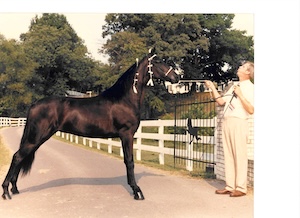 Washburn asked Charles what he would take for his pony. “I don’t want to sell him,” Charles said. “He’s my transportation.” But Washburn insisted, and the two haggled over a price. Thinking a price ridiculously high would scare Washburn off, Charles priced his pony at $350. Washburn said he was crazy, but then later returned with a check. And while he may have lost his pony, he gained a great story. Charles did not see Lloyd Washburn again until a farmer’s auction in December of 1960, when Charles was 19. Washburn spotted Charles and said aloud to the assembled group of farmers, “You see this old boy coming here? I'm going to tell you a story about him.” This got Charles’s attention. Washburn continued, “You remember that little pony of yours I bought? I made $35 off of you. That's the most I've ever made, day trading.” Charles joined in the laughter before flipping the script. “Mr. Lloyd, I’ve never told you this,” he countered. “But I just gave $50 for him. I made $300 off of you!” The farmers roared their approval and heckled Washburn to the point that he packed up and left. Charles remembered that story fondly.
Washburn asked Charles what he would take for his pony. “I don’t want to sell him,” Charles said. “He’s my transportation.” But Washburn insisted, and the two haggled over a price. Thinking a price ridiculously high would scare Washburn off, Charles priced his pony at $350. Washburn said he was crazy, but then later returned with a check. And while he may have lost his pony, he gained a great story. Charles did not see Lloyd Washburn again until a farmer’s auction in December of 1960, when Charles was 19. Washburn spotted Charles and said aloud to the assembled group of farmers, “You see this old boy coming here? I'm going to tell you a story about him.” This got Charles’s attention. Washburn continued, “You remember that little pony of yours I bought? I made $35 off of you. That's the most I've ever made, day trading.” Charles joined in the laughter before flipping the script. “Mr. Lloyd, I’ve never told you this,” he countered. “But I just gave $50 for him. I made $300 off of you!” The farmers roared their approval and heckled Washburn to the point that he packed up and left. Charles remembered that story fondly.
“I’ve had a great life for a country boy,” he said.
Charles is proud of his humble origins in Petersburg. He would walk several miles to and from school each day, and on many of those days, he would return home just to hook up mules to plow until dark. “We didn’t get electricity until 1949,” Charles said, when he was eight years old. “We didn’t get a bathroom until ’56.” But to Charles, as is the case with so many of us, it encapsulated his sense of normal. Well, except perhaps one thing. Prior to getting an indoor bathroom, “I always wondered why we had an outhouse back there that had two holes in it,” Charles laughed. “Two people ain’t going at the same time, are they?” He says it’s always important to remember where you come from.
In order to start the fall semester at Middle Tennessee State College, as it was then known in 1960, Charles had to take a circuitous route each week. “My mom would fry me a chicken and cook me a dozen biscuits and put them in tin foil,” he said. “She would carry me to Chestnut Ridge, put me out on the road, and I thumbed my way to Murfreesboro, every Sunday afternoon.” Then every Friday afternoon, he would hitchhike back to Fayetteville, where his mother would pick him back up after she got off work. “I was raised tough,” he said. “I wasn’t born with a silver spoon in my mouth.” During that fall semester in Murfreesboro, Charles got a job on a milk route at four o’clock every morning, earning 50 cents per hour. As Christmas neared, he had saved up enough money to return to school in January. But then he got a phone call that changed the trajectory of his life.
The principal of Boonshill High School in Fayetteville, where Charles graduated, was a man named E. C. Norman. Charles had a great relationship with him, as evidenced by the fact that on December 22, 1960, Norman called Charles and said a local bank was looking for a farm boy with a good work ethic that they could hire.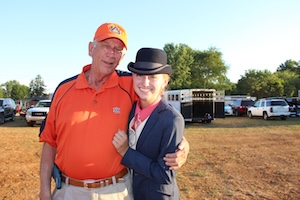 Norman thought of Charles and said that if he was interested in becoming a banker, he should go interview later that week. “I went on Friday and interviewed,” Charles said. “Five men interviewed me, and I was scared to death. They hired me for $2.17 an hour, which is about what I make now. That was on Christmas Eve, and this December that will be 65 years ago.”
Norman thought of Charles and said that if he was interested in becoming a banker, he should go interview later that week. “I went on Friday and interviewed,” Charles said. “Five men interviewed me, and I was scared to death. They hired me for $2.17 an hour, which is about what I make now. That was on Christmas Eve, and this December that will be 65 years ago.”
Over the course of those years, Charles has bought three banks, sold two banks and started two new banks. “I guess I’m a half-decent salesman,” Charles joked, “to talk people into putting their money with me. Trusting me to open a bank.” He bought his first bank when he was just 33, on the advice of a man he thought he could trust. The bank subsequently folded three years later, and Charles lost everything. “But what I didn’t do,” he remembered, “I didn’t quit. I bought it when I was 33, sold it when I was 37, and then bought it back when I was 43. And when I went back, I had a different attitude.” He had learned his lesson. And one of the greatest lessons was having the right people around you. “It’s all about great people,” he said. “You’ve got to trust folks. You won’t be right every time, but you’ve got to try to be right 98 percent of the time.” Even though Charles has opened and run some successful banks in northern Alabama, his primary location has always been Fayetteville.
Charles has had a long history with the Fayetteville horse show. He remembered attending it first as the Lions Club show, many years ago, before it disbanded. Charles wanted to bring it back, and he wanted to do it for local 4H students. “I went to the 4H leaders in Lincoln County,” he said, “and told them I wanted to start a horse show in Fayetteville for those kids. Because they take trips, and do a lot of other stuff, and they needed something to help make them some money. The University of Tennessee gives them very little, believe it or not.” The first edition of the Fayetteville horse show as we now know it was in 1982, with the understanding that if the show lost money, Charles would pay for it. Fortunately, the show made $5,000 for the Lincoln County 4H in that first year, and his employees at the bank helped cook concessions. Charles ran the show for the next 30 years, where it continued to grow and grow. Charles takes a lot of pride in what he helped accomplish for the local 4H program, which now sits in the top five in the state annually.
Just a few years after getting the Fayetteville horse show up and running, Charles was approached by Walt Chism and Steve Smith, with regard to the upcoming presidential election at the Tennessee Walking Horse Breeders and Exhibitors Association (TWHBEA). Chism and Smith wanted Charles to run for President in 1988. Charles admits that at that time, the Breeders Association was in dire need of help, so not only did he agree to run, he won. He brought the association back to financial stability, and he led a successful campaign to carry association membership to new heights. “When I went there,” he said, “I didn't do it by myself. It was Chism, Smith, Carroll Benedict, Tom Bowles, those types of people. I had a great board of businessmen. And we carried it to over 20,000 members.” Charles was re-elected as President in 1990, and then he ran again in 1996 and won. He followed that by winning another re-election in 1998, making him the only four-term President in the history of TWHBEA. Charles still works closely with TWHBEA today, and he is very complimentary of the current Executive Director, Mark Farrar, Jr. “I think he’s doing a great job,” he said. “He’s open-minded, too. He trusts me a lot and still lets me advise him on his financials.”
Charles Gleghorn’s life in the Tennessee Walking Horse industry ventures inside the show ring, as well. For decades, he has been regarded as a successful owner, breeder and exhibitor. He and his late wife, Joy, first got their start in halter classes. “Back then, I could afford to show a yearling,” he said.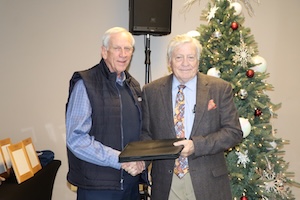 “I couldn’t afford $500 a month in training fees.” And once he got his hands on weanlings and yearlings, he found he had a real knack for it. “A good halter colt is not necessarily going to make a good show horse,” he continued. “It’s the overstride of a baby colt that you’re looking for. If they’re sticking out their little butt and shaking their head and walking, you’ve got a good shot at winning. But if they’re not overstriding, if that back foot isn’t going past that front foot, you should probably put them back in the barn. Doesn’t mean he’s not a good colt. Just means he’s not a good halter colt.”
“I couldn’t afford $500 a month in training fees.” And once he got his hands on weanlings and yearlings, he found he had a real knack for it. “A good halter colt is not necessarily going to make a good show horse,” he continued. “It’s the overstride of a baby colt that you’re looking for. If they’re sticking out their little butt and shaking their head and walking, you’ve got a good shot at winning. But if they’re not overstriding, if that back foot isn’t going past that front foot, you should probably put them back in the barn. Doesn’t mean he’s not a good colt. Just means he’s not a good halter colt.”
Charles has led countless halter entries to the Tennessee Walking Horse National Celebration over the years, winning his fair share of blue ribbons. He also had success in the Lead Line classes, which any judge will tell you is far more difficult to judge than the World Grand Championship class. With the help of his trusted pony, Shake’s Little Midnight, Charles led the children of numerous friends into the Celebration Big Oval. “I showed Ronal Young's daughter, Steve Aymett's daughter and Steve Beech's daughter,” he said. “I showed my daughter, and then I showed my two granddaughters on Shake’s Little Midnight. We won seven world championships. And, you know, it's work, but it's fun, and it's good for the kids.”
As an owner, Charles is recognized for his successes in the show careers of Pride’s Merry Maker, Ebony’s Darling Girl, Coin’s Dixie Belle and Cash In My Stock. Another favorite of his that he continually references is Black Rain. Black Rain won the International Championship in 1995, a win that placed him among the favorites at The Celebration that year. Charles praises how natural that horse was, and how cool and calm he always was during the inspection process. “People wouldn’t believe it if I told them the truth about Black Rain. I could bring him home from a show and put him in a stall, then if you take him out and put an action device on him and take him out the field? If you didn’t like what he could do, then something’s wrong with you.”
Another aspect of Charles’s life that is no secret to those who know him is his connection to Auburn University. He is quick to point out that his affinity for the school had nothing to do with football or basketball, although now he is a fan and supporter of both. “My son, Carl, he’s an artist, he’s been drawing ever since he was two or three years old,” he said. “I told him he couldn’t make a living drawing art, but you could go to school and become an architect.” That sent Joy, whom Charles says was always “the brilliant one,” on a mission to find the best architectural school in the country. Turned out, Auburn had one of the top programs at that time, so despite three scholarship offers from art colleges, Carl chose to go to Auburn. Carl’s younger sister, Gay, followed him to Auburn a few years later, to study business and finance. To date, Charles has graduated two children and four grandchildren from Auburn.
To an outsider, the friendship that developed between Charles and the late Pat Dye may strike some as surprising. Dye was the head football coach at Auburn from 1981 to 1992. He coached Bo Jackson during his Heisman Trophy-winning season in 1985, and captured three straight Southeastern Conference titles, from 1987-89. But to uncover how this friendship started, one must first learn the story of Pat Blake. Pat worked at a foundry in Lewisburg, Tennessee, and he also worked on Charles’s farm in the afternoons for 20 years.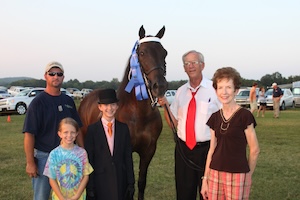 Although Pat had several children, two of them ended up being standout football players for Lincoln County High School. One was a running back, named Ricky Blake, who graduated as the school’s all-time leading rusher, with records that still stand to this day. His younger brother was Eddie Blake, an offensive lineman. It was not uncommon for Ricky and Eddie to accompany Pat out to Charles’s farm in the afternoon to ride horses when they were still just young boys. One day, Pat took Charles aside and said he needed to ask a favor of him. Pat had received a stage-four cancer diagnosis, and he asked Charles to help look after his two boys when he was gone.
Although Pat had several children, two of them ended up being standout football players for Lincoln County High School. One was a running back, named Ricky Blake, who graduated as the school’s all-time leading rusher, with records that still stand to this day. His younger brother was Eddie Blake, an offensive lineman. It was not uncommon for Ricky and Eddie to accompany Pat out to Charles’s farm in the afternoon to ride horses when they were still just young boys. One day, Pat took Charles aside and said he needed to ask a favor of him. Pat had received a stage-four cancer diagnosis, and he asked Charles to help look after his two boys when he was gone.
As Ricky and Eddie grew and developed into local football stars, colleges started to take notice. Johnny Majors and Philip Fulmer from the University of Tennessee reached out, among several others. One of those others was Pat Dye. Coach Dye learned that Charles was a source of influence on the Blakes, so he reached out to Charles directly. Coach Dye brought his offensive and defensive coordinators to Fayetteville, where Joy treated them to a grand country supper. Turned out, Coach Dye was a horseman himself and owned a 1,500-acre farm in Alabama. Charles sold Coach Dye a bull and later bought him his first Tennessee Walking Horse. A friendship was struck, and that friendship was maintained and strengthened over the next 34 years. “He was a great guy,” Charles remembered. “He used to come stay with me. And then when Joy died, he called me and invited me to come stay with him for a few days.” When Coach Dye passed away in 2020, Charles was one of only 40 guests invited to his funeral.
Ricky ultimately elected not to choose Auburn, selecting instead to play football at a junior college in Mississippi before transferring to the Canadian Football League. Eddie, however, did decide to play football at Auburn for Coach Dye, which he did with distinction from 1988-91. Eddie was named First-Team All-SEC as a senior, before he was taken in the second round by the Miami Dolphins in the 1992 NFL Draft. Ricky found his way to the NFL, as well, getting picked up as a free agent by the Dallas Cowboys in 1991. Their stories are remarkable, in part because of the support they received from one Charles Gleghorn. But giving back to others is something that is very important to him, especially as someone who understands humble upbringings as well as anyone. As stated previously, Charles says he always tells people that it’s important to remember where you come from. “And remember how you got there,” he said. “You don’t get there by yourself. And only by the grace of God do you survive.”
In his continued efforts to assist with the disadvantaged, Charles worked with the Lincoln County Public Housing Program for 30 years. At one point, the Lincoln County housing projects had over 90 vacancies, and Charles convinced the housing board to write a letter to the United States Department of Housing and Urban Development (HUD). The letter asked HUD for permission to tear down 50 units, buildings that were all inhabitable and rat-infested. “Let’s build a playground area and clean this place up a little bit,” he said. “So we wrote them, and they turned us down. I didn’t care for that, at all.” A few weeks later, the board wrote another letter and received yet another rejection. Charles then took it upon himself to write his own letter, highlighting the fact that two previous letters has been sent, and he didn’t see the need for continued waste of taxpayer dollars. “We’re going to ask you one more time to allow us to tear down 50 units,” he continued. “And if you refuse, we want the opportunity to bring you our records to Washington to show you how you waste money. And I signed it.” At this point in the story, a wry grin appears on Charles’s face. Within 10 days, they received permission to tear down the unused units. A few years later, the county and community built a new community center in the same neighborhood. “It was real nice,” Charles proudly proclaimed. And then it was christened: The Charles E. Gleghorn Community Center.
“It’s how you go about things, that you get things done,” Charles stated.
From where he came from, to where he sits now, it’s impossible for Charles to overlook his blessings. “There ain’t nobody who’s been more blessed than this guy,” he said. “My biggest asset, that I’m most proud of, is my children. They’re responsible, they’ve never given me any trouble. There’s just too many moms and dads that don’t take enough time. 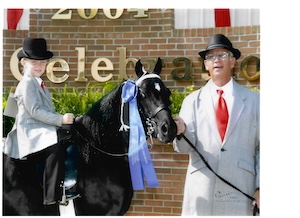 Take time with your kids! That’s the most valuable thing you’ve got that you can give them.” He swells with pride to report that his daughter has been elected to serve as the President of Tennessee Bankers next year, and that she has led the Bank of Lincoln County to being ranked second in the state of Tennessee. Charles’s son-in-law, also a banker, has the North Alabama Bank rated number 11 in the state of Alabama. These days, at 84 years young, Charles continues to stay involved by going to board meetings and loan committee meetings. He also still operates his farm and runs its day-to-day operations, but he admits that now he’s starting to downsize. “I did have 85-90 cattle, and now it’s down to 35. I’ve got 27 broodmares, and I’m looking to get that number down to about 12.” Charles also likes to tease his children about being reckless with his money. “I’m going to have a little fun with my horses, I’m going to waste a little money, but don’t worry about it.” He also owns some young horses sired by the likes of Honors and I Am Jose’, and he is excited about their early prospects in the show ring.
Take time with your kids! That’s the most valuable thing you’ve got that you can give them.” He swells with pride to report that his daughter has been elected to serve as the President of Tennessee Bankers next year, and that she has led the Bank of Lincoln County to being ranked second in the state of Tennessee. Charles’s son-in-law, also a banker, has the North Alabama Bank rated number 11 in the state of Alabama. These days, at 84 years young, Charles continues to stay involved by going to board meetings and loan committee meetings. He also still operates his farm and runs its day-to-day operations, but he admits that now he’s starting to downsize. “I did have 85-90 cattle, and now it’s down to 35. I’ve got 27 broodmares, and I’m looking to get that number down to about 12.” Charles also likes to tease his children about being reckless with his money. “I’m going to have a little fun with my horses, I’m going to waste a little money, but don’t worry about it.” He also owns some young horses sired by the likes of Honors and I Am Jose’, and he is excited about their early prospects in the show ring.
Thinking back, all those years ago, to when Charles bought his first pony, and comparing that to how he feels about walking horses today, Charles is questioned on what has stayed the same throughout. “For me? The love of them,” he said. “The industry has changed tremendously, and sadly not all of it is for the best. But for all its headaches and problems, I still love it. I love these horses so much.”
Charles wants nothing more than to see the Tennessee Walking Horse industry return to some of its former glory, but he feels that in order to do so, the industry must come to grips with some harsh truths. “There are ways to fix it,” he said. “But it would take a strong stomach.” Charles has some strong ideas in this regard. He would like to see a return of the Walking Horse Commission, and he says what the industry desperately needs right now is consistency and discipline, two subjects at which he can talk for great lengths. He knows some of his ideas would ruffle feathers, but he is not worried about it. “You’re never going to make everyone happy,” he said. “And you better understand that up front. I’ve always tried to be straight up with everything I’ve ever done. I look back on my life and I don’t have any regrets.” Is he ever worried about pushback on any of his ideas for the walking horse industry? “Hey, when they talk about me, I say they’ve got a good subject,” he responded with a hearty laugh.
Charles Gleghorn’s love of the Tennessee Walking Horse is undeniable. And his life has certainly contained multitudes. It is not an overstatement to call him a man of contradictions. Starting weanlings and starting banks. Humble origins and multimillion-dollar buyouts. Tennessee Walkers and War Eagle. And throughout it all, his hands have never stopped reaching for halters. All his life, Charles has been drawn to Tennessee Walking Horses, so much so that he may not realize that it was the other way around the entire time.